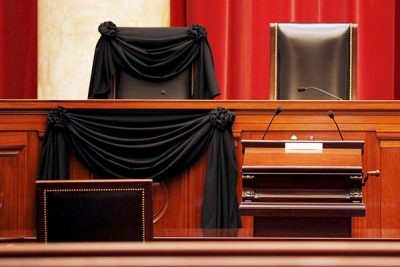By
Tom Arms
It is none of the rest of the world’s damn business which eminent American jurist is chosen to replace the exceptionally eminent Antonin Scalia on the US Supreme Court.
It is an entirely domestic matter in the hands of the President with the approval of the Senate.
What is the rest of the world’s business is the unseemly partisan squabbling by the world’s greatest power which is bringing the political wheels to a grinding halt while the entire globe is engulfed in one crisis after another.
And the wrangle over Scalia’s successor is seen by other inhabitants of Planet Earth as only symptomatic of a wider malaise that appears to have infected the entire American political establishment.
Congress hates and blames Obama. Obama hates and blames Congress. Hilary attacks Sanders. Rubio and Cruz attack Sanders, Clinton, Obama and Trump. Billionaire builder Donald Trump doesn’t have a nice thing to say about anyone anywhere.
Politics, said Otto von Bismarck, is “the art of the possible.” But learning what is possible requires the ability to listen and compromise as well as to argue and stand firm on principle.
Looking at the USA from this side of the Atlantic, it seems that not since the Vietnam War has the country been so polarised and divided. This time, however, it is not a single issue which divides the country. If only it was. This time it is a complex web of conflicting issues and beliefs. I suspect that it is as confusing to everyday Americans as it is to people living in the African bush.
The politicians who are meant to lead and shed light on the way forward, spend their time shouting at each other through megaphones with cotton stuffed firmly in their ears.
Gridlock has long been used to describe Washington’s traffic problems. Now the same is being applied to its politics.
Gridlock or deadlock also describes the Supreme Court until a replacement is found for Justice Scalia. To avoid this problem the constitution allowed for nine justices. Now there are eight, and—surprise, surprise—they split equally along party lines—Republican v. Democratic, conservative v. liberal.
There are a number of major issues before the court at the moment: The future of public sector unions, abortion regulation and President Obama’s immigration policies to name but a few.
These are important domestic issues. Some of them—such as the president’s immigration policies—have international repercussions.
The last three justices to secure appointment to the Supreme Court required 87, 66 and 82 days from nomination to Senate confirmation. The last date oral arguments can be heard by the current session of the court is the 27th of April. That is about 60 days away. So even if the White House and Senate were in total accord, the empty seat is highly unlikely to be filled before the current session ends at the end of June or early July.
But the next session is another matter. That starts at the beginning of October—more than 200 days ahead. And if the nomination is put on hold until after the election – which is what a number of particularly partisan Republicans want– then we are talking about an entire year before the end of deadlock at the top of America’s legal pyramid.
Of course, if you are a Republican arguing for a holding pattern you are taking a gamble. Suppose a democrat is elected president in November and his party also wins control of Congress. You have then lost the power of influencing the selection through delay and debate.
And then suppose that after the election the legislative and executive branches remain split between opposing camps. Does that mean that no one should—or can be appointed—to the Supreme Court for another four years?
US politicians love standing on flag-draped podiums and extolling the greatness of America and, by implication their own powerful positions. They argue forcefully – and correctly– that America is the world’s most powerful nation and therefore justified in taking the lead.
Well, as Spiderman’s Uncle Ben said with his dying breath: “With Great power comes great responsibility.
Tom Arms broadcasts on world affairs for a number of US radio stations including WTKF at http://www.wtkf107.com/. His Weekly Viewpoints discussion programme can be heard at 1830 EST on Wednesdays and his LookAhead at the next week’s main events on Fridays at 1800.
LookAhead Radio World Report for week commencing 29th February:



No Comments Yet!
You can be first to comment this post!